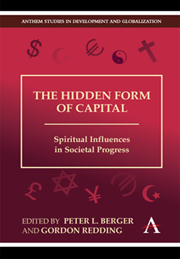Book contents
- Frontmatter
- Contents
- Contributors
- Preface
- Chapter 1 Introduction: Spiritual, Social, Human, and Financial Capital
- Chapter 2 Do Some Religions Do Better than Others?
- Chapter 3 Spiritual Capital and Economic Development: An Overview
- Chapter 4 The Possibilities and Limitations of Spiritual Capital in Chinese Societies
- Chapter 5 How Evangelicanism – Including Pentecostalism – Helps the Poor: The Role of Spiritual Capital
- Chapter 6 Flying under South Africa's Radar: The Growth and Impact of Pentecostals in a Developing Country
- Chapter 7 Importing Spiritual Capital: East-West Encounters and Capitalist Cultures in Eastern Europe After 1989
- Chapter 8 Orthodox Spiritual Capital and Russian Reform
- Chapter 9 Islam and Spiritual Capital: An Indonesian Case Study
- Chapter 10 Separating Religious Content from Religious Practice: Loose and Tight Institutions and their Relevance in Economic Evolution
Chapter 7 - Importing Spiritual Capital: East-West Encounters and Capitalist Cultures in Eastern Europe After 1989
Published online by Cambridge University Press: 05 March 2012
- Frontmatter
- Contents
- Contributors
- Preface
- Chapter 1 Introduction: Spiritual, Social, Human, and Financial Capital
- Chapter 2 Do Some Religions Do Better than Others?
- Chapter 3 Spiritual Capital and Economic Development: An Overview
- Chapter 4 The Possibilities and Limitations of Spiritual Capital in Chinese Societies
- Chapter 5 How Evangelicanism – Including Pentecostalism – Helps the Poor: The Role of Spiritual Capital
- Chapter 6 Flying under South Africa's Radar: The Growth and Impact of Pentecostals in a Developing Country
- Chapter 7 Importing Spiritual Capital: East-West Encounters and Capitalist Cultures in Eastern Europe After 1989
- Chapter 8 Orthodox Spiritual Capital and Russian Reform
- Chapter 9 Islam and Spiritual Capital: An Indonesian Case Study
- Chapter 10 Separating Religious Content from Religious Practice: Loose and Tight Institutions and their Relevance in Economic Evolution
Summary
…Of the last stage of this cultural development, it might well be truly said: ‘Specialists without spirit, sensualists without heart; this nullity imagines that it has attained a level of civilization never before achieved’.
(Max Weber)This paper is my latest attempt in a series at comprehending the spirit of new capitalism in Eastern Europe. In contrast to a widespread view according to which this spirit is extremely weak, I will suggest that its real strength cannot be discovered if one a.) looks for it only in the delicate and airy forms of economic culture; b.) focuses exclusively on the anti-capitalist legacy of communist economic culture, ignoring its pro-capitalist heritage; c.) disregards a large-scale borrowing of economic cultures from the West during the past two decades.
First the thesis of ‘spiritless capitalism’ will be discussed. Then, I will introduce the concepts of ‘soft culture’ and ‘implicit spirituality’, as well as sketching up the road that led me to a research project on transnational cultural encounters in the economies of Eastern Europe. In the second half of the paper, one of the project's core empirical studies, which has been made in the heart of the ‘emerging markets’, banking, will be revisited to test the applicability of the notion of spiritual capital in secular societies of the region. In contrast to the assumption of a lack of capitalist spirit, one witnesses a veritable pro-capitalist cultural revolution unfolding in a major field of the post-communist economies, even if its results seem rather fragile for the time being.
- Type
- Chapter
- Information
- The Hidden Form of CapitalSpiritual Influences in Societal Progress, pp. 133 - 170Publisher: Anthem PressPrint publication year: 2010
- 1
- Cited by



